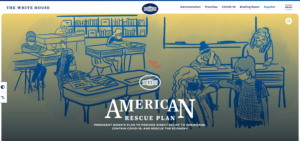
Anti-poverty and unemployment experts have praised the recent passage of H.R. 1319, better known as the American Rescue Plan. Plan proponents say that up to 85% of Americans could receive a $1,400 stimulus check — and many will receive an extension of the $300 per-week extra unemployment benefits through Sept. 5 and an expansion of the low-income Child Tax Credit. Covered California hailed the law’s passage. And non-partisan, nonprofit health advocacy group United States of Care called the American Rescue Plan Act of 2021 a “major step toward defeating the virus and ending the pandemic.” What does it mean to the insurance industry?
H.R. 1319 includes a provision (Title IX, Subtitle F) that helps those who lose employer coverage keep COBRA benefits in place through the end of September. The provision provides a tax credit that employers can use to pay to keep coverage for departing workers in place, without employees having to pay anything out of pocket for the coverage.
Title IX, Subtitle A, Part 7 drastically, though temporarily, expands the subsidies that people can use to pay for coverage from the Affordable Care Act health exchange. These enhanced subsidies will start April 1, according to HHS.
These subsidies would expire by the end of 2022. However, Congress could always decide to extend the time that the health insurance finance arrangements stay in place.
FSAs
Dependent Care FSAs Get Needed Boost
The American Rescue Plan also includes a temporary increase, for 2021, in the maximum amount that can be contributed to a dependent care flexible spending account from $5,000 to $10,500. The $5,000 limit, established in 1986, hasn’t increased since. Furthermore, if that limit established in 1986 would’ve kept up with inflation it would be more than $12,000. Proponents say the new relief is particularly welcome at a time when American households are struggling with the impact of the pandemic-induced recession. The tax savings will reduce the cost of childcare. Moreover, advocates will likely agitate to make the increase permanent. Keep your ears perked for more action in this area.
LIFE
Hot Off the Press: COVID Mortality Analysis
The Individual Life COVID-19 Project Work Group released a report titled U.S. Individual Life COVID-19 Mortality Claims Analysis. LIMRA, Reinsurance Group of America Inc., The Society of Actuaries and TAI (a reinsurance administration software company) sponsored the report.
Here are some highlights, according to the researchers:
The second quarter of 2020 all-cause individual life death counts were in the range of 110% to 113% for the second quarter in the previous five years. This was lower than the CDC’s second quarter estimate of 118% to 123% for the population.
The average attained age at death of the individual life COVID claims is 0.6 years older than the average age of non-COVID claims. The U.S. population had a much larger difference of 3.0 years between the average attained age of COVID and non-COVID deaths.
COVID deaths made up 6.7% of the known insured claims and 7.3% of the total U.S. population deaths in the first half of 2020.
All-cause claim counts for 2020 by underwriting class are counter-intuitive for ages 60 and above, with the preferred class risks having larger relative year-over-year increases than other risk classes including substandard. Non-smokers were also observed to have higher percentage increases than smoker classes for key age groups.
Access the full report here.
CE
GIVE
Exercise for IICF COVID Relief
The Insurance Industry Charitable Foundation’s Step Up Challenge is March 29. This is an international exercise challenge to raise funds for children and communities at risk. Funds raised benefit 2021 IICF COVID-19 Relief Funds in the US and UK. Moreover, all funds raised in a region will remain local. U.S. participants register here. Click here to learn more about the 2021 IICF International Step Up Challenge.
HEALTH
Most Millennials Google Health Advice Instead of Going to the Doctor
Millennials, the largest generation right now, can’t be ignored. Harmony Healthcare IT recently surveyed some 2,040 millennials on the topics of healthcare, primary care physicians and annual physical exams during the pandemic.
Here’s what they found:
- 79% of millennials say they have a primary care physician (up 3% from 2019).
- 65% of millennials received a yearly check-up during the pandemic (this number remained unchanged from 2019).
- 43% of millennials have been ignoring a health issue. 33% report ignoring a health issue for over a year (down 2% from 2019).
- The most common reasons millennials put off annual check-ups over the last year: 1. The pandemic 2. They feel healthy 3. Too expensive 4. Too inconvenient 5. Prefer urgent care.
- 69% of millennials report searching Google for health advice instead of going to the doctor. 24% trust Google to diagnose their symptoms.
- Top ways millennials find medical advice: 1. WebMD 2. News articles 3. YouTube 4. Health apps 5. FamilyDoctor.org 6. Reddit.
To be perfectly honest, we’d never heard of FamilyDoctor.org, but it’s the site for the American Academy of Family Physicians. No idea how millennials know that, but we suspect the site must have great SEO. Anyhow, you can access the full report here. There’s some interesting info about millennial medical debt you might want to check out.
CAL Broker
Take Our Survey & You Might Win $
There’s still time to take the 2021 California Broker reader survey and be entered to win $500. Take the super quick survey here.
EVENTS
- NAHU Power Hour, 4th Wednesday of the month from 4-5p.m. Pacific. Members and nonmembers welcome. Register here.
- LAAHU DEI Book Club, discussing Miles McPherson’s book, The Third Option, runs through Sept, Register here.
- NAIFA-LA, ABCs of Annuities with Alvin Parra, Aaron Gravel and Brendan Lavelle, Virtual, March 18, register here.
- CAHU Women’s Leadership Summit, POSTPONED Email questions to info@cahu.org.
- National Association of Insurance Commissioners (NAIC) Spring National Meeting, Virtual, April 7-9 and April 12-14. Register here.
- Insurance Advertising Compliance Association conference, Virtual, April 22-23, Register here.
-
IICF International Inclusion in Insurance Forum, June 15-17
The Insurance Industry Charitable Foundation is convening insurance professionals, C-Suite executives, D&I leaders and other innovators from around the globe for the IICF International Inclusion in Insurance Forum, an action-oriented program with a unique focus on an inclusive future for the industry. Register here. - American Association for Medicare Supplement Insurance, National Medicare Supplement Insurance Industry Summit, Sept 8-10, Schaumburg Convention Center, Chicago area, info here.

